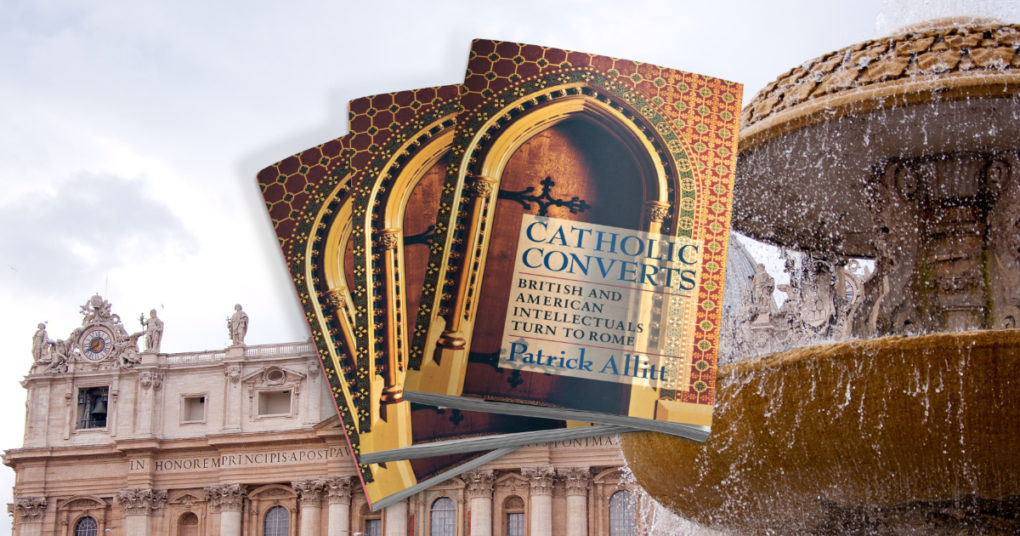Catholic Converts
Patrick Allitt
Cornell University Press
1997
340 pages
Patrick N. Allitt is a British historian and academic who serves as the Cahoon Family Professor of American History at Emory University, Atlanta. Among other things, he teaches courses on American intellectual, environmental, and religious history. An Oxford graduate, he completed a Ph.D the University of California Berkeley and held postdoctoral fellowships at Harvard Divinity School and Princeton University.
Allitt reveals himself to be an erudite literary genius who succeeds in giving a helicopter view of great converts who have helped to shape the modern era. He also gently suggests the benefit of reading them.
Well written, not for the faint hearted, the book examines many converts particularly in the nineteenth century with their influence on the twentieth. The main thesis is that they were way above the intellectual capacity of their born Catholic contemporaries.
The middle and late nineteenth century witnessed a flourishing literature in English on behalf of Catholicism. It flowed mainly from the pens of Catholic converts. By 1850 converts dominated the intellectual life of British and American Catholicism. They wanted to devote their energy to converting more Protestant intellectuals.
Besides Newman he delves into other conversion stories, many much less well known and interesting for that fact (e.g. Christopher Hollis and Arnold Lunn). He gives a glimpse of that century from a historical perspective and you find there were as many issues in the Catholic Church then as there are today. English converts sacrificed much: rejection by family and friends, social status, sometimes employment. It was real sacrifice. The general impression is that young Catholics today would benefit from a much great familiarity with these writers.
The converts were well able to face their critics. They refuted Darwin and received a rebuke from Huxley who said that “The Catholic Church was the vigorous and consistent enemy of the highest intellectual, moral and social life of mankind.” Mivart replied that “Darwin’s ideas tend in the intellectual order to the degradation of the mind.” Elizabeth Kite in the USA through her research was able to show that without Catholic France and the its pious king Louis XVI, the USA would never have become independent. Cornelia Connelly founded the Society of the Holy Child Jesus, an educational order for English Catholic girls, after the failure of her marriage. Dorothy Day, whose process of beatification is ongoing, founded the Catholic Worker Movement also after the failure of her marriage.
Allitt highlights other women converts and the major contributions they made, particularly in trying to pull Catholicism as a whole towards greater intellectual engagement with the rest of the world. Converts played a central role in the Catholic revival in both Britain and the United States. Novelists among them made Catholicism an important part of twentieth century English literature.
Christopher Dawson in the 1920s and 30s saw that there was a much more complex interplay of material, psychological, and spiritual forces at play in any culture than Hegel, Marx, Comte or Spencer had admitted. “Culture is not a necessary result of climatic and economic determinism, it is world of art, a triumph of human inventiveness and endurance, and it is the fruit of an age long cultural tradition…. Behind the cultural unity of every great civilisation there lies a spiritual unity.” He challenged the ideas of Freud.
If we consider Malthus, Freud and Marx as among the thinkers whose ideas have most shaped the twentieth century, then it makes a lot of sense to be familiar with the authors who refuted them. Arnold Lunn said that “Freudianism was really a contemporary form of laziness.” Dawson predicted that communism was destined to pass away. In the 1930s Evelyn Waugh and Graham Greene surprised secular critics by asserting the continuing importance of the Catholic faith. Sykes, the biographer of Waugh, said, “Evelyn was doing something which seemed in England to have gone out of fashion forever, he was making religion the central point of a story about contemporary English life, and approaching his theme with respect and awe.” Neither author saw themselves as simply a “Catholic novelist”.
Other famous converts included Marshall McLuhan and Jacques Maritain. McLuhan in the 1940s said, “It seems obvious that we must confront the secular in its most confident manifestations and, with its own terms and postulates, to shock it into awareness of its confusion, its illiteracy, and the terrifying drift of its logic”. Maritain had become a Catholic in 1906 and was to influence the conversions of McLuhan, Thomas Merton, Avery Dulles and Eric Gill.
Allitt covers converts up to the Second Vatican Council. He says postconciliar converts require another volume.
About the Author: Rev. Conor Donnelly
Rev. Conor Donnelly qualified as a medical doctor in University College Dublin in 1977 and worked for a year at St. Vincent’s Hospital, Dublin. After ordination he has spent twenty-two years doing pastoral work in Asia, in the Philippines and Singapore. He is currently an assistant chaplain at Kianda School in Nairobi.

